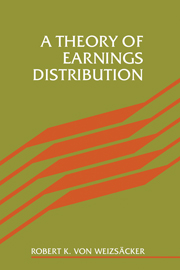Book contents
- Frontmatter
- Contents
- Preface
- Introduction: presentation of problem and overview
- 1 The general structure of the model
- 2 A life-cycle model of individual earnings
- 3 The distribution of earnings within age groups
- 4 The overall distribution of earnings
- 5 The distribution of lifetime earnings
- Selected results
- Appendix 1 Comparative static analysis of the optimal length of basic education
- Appendix 2 Comparative dynamic analysis of the optimal age–earnings profile
- Appendix 3 The distribution factors Va1, Vb, ρa1b: an illustration
- Appendix 4 Technical details for Section 3.4
- Appendix 5 Technical details for Section 4.1
- Appendix 6 Comparative static analysis of optimal lifetime earnings
- References
- Index
- Selected notation
Introduction: presentation of problem and overview
Published online by Cambridge University Press: 06 July 2010
- Frontmatter
- Contents
- Preface
- Introduction: presentation of problem and overview
- 1 The general structure of the model
- 2 A life-cycle model of individual earnings
- 3 The distribution of earnings within age groups
- 4 The overall distribution of earnings
- 5 The distribution of lifetime earnings
- Selected results
- Appendix 1 Comparative static analysis of the optimal length of basic education
- Appendix 2 Comparative dynamic analysis of the optimal age–earnings profile
- Appendix 3 The distribution factors Va1, Vb, ρa1b: an illustration
- Appendix 4 Technical details for Section 3.4
- Appendix 5 Technical details for Section 4.1
- Appendix 6 Comparative static analysis of optimal lifetime earnings
- References
- Index
- Selected notation
Summary
The distribution of income is one of the main features of any social system. David Ricardo, the classical economist par excellence, regarded the determination of income distribution as the most important task facing economics. This view is no longer widely held in the face of today's problems (unemployment, inflation). Nevertheless, the stagnation in economic growth in virtually all modern industrialised societies, which has become the subject of public debate recently, has meant increasing pressure for more attention to be paid to the distribution of the national cake, now that this seems to have reached a maximum for the time being.
Whereas Ricardo's statement was related to the rewards to aggregate factors of production such as labour, capital and land (i.e. to the distribution of factor incomes), today's distributional debate is increasingly concerned with disaggregated considerations. The distribution of factor incomes, which was the central object of research in distribution theory in the eighteenth and nineteenth centuries, has been replaced by, for example, the institutional, structural, sectoral or sociological distribution of income. There can be no doubt, however, that the focal point of interest is the distribution of personal income. This is the aspect which lies at the root of modern distribution policy controversies, not least because the conventional classifications have little normative significance for the social problem of inequality of income. A distributional policy which seeks to address this issue does, however, require a rational foundation, i.e. a theory of personal income distribution.
- Type
- Chapter
- Information
- A Theory of Earnings Distribution , pp. 1 - 5Publisher: Cambridge University PressPrint publication year: 1993



